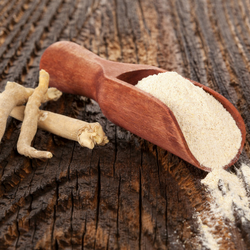Can Supplements Truly Lift Your Mood?

Mood is one of those human experiences that’s difficult to quantify, tricky to change.
You know when you’re in a good mood and when things are sour. But what’s at work physiologically in determining your mood? Can transitory events, like a baby shower, cause mood swings? Can you change your mood with a simple shift in outlook? Can supplements help?
 When it comes to shaping your mood, it might help to think of it like building a house; you start by fortifying the foundation with more bricks and mortar. For the brain—your body’s cornerstone—that means fat. The brain is composed of 60 percent fat, and one of the predominant fats is the omega-3 fatty acid DHA, an important component of the brain’s neuronal membranes. Supplementing with DHA contributes to higher DHA levels in the brain, which are crucial to maintaining brain function.
When it comes to shaping your mood, it might help to think of it like building a house; you start by fortifying the foundation with more bricks and mortar. For the brain—your body’s cornerstone—that means fat. The brain is composed of 60 percent fat, and one of the predominant fats is the omega-3 fatty acid DHA, an important component of the brain’s neuronal membranes. Supplementing with DHA contributes to higher DHA levels in the brain, which are crucial to maintaining brain function.
In fact, an expert panel commissioned by the U.S. military looked at nutrition standards among service members and found that DHA may improve stress resilience among soldiers who are, let’s face it, put in pretty stressful situations. DHA was also seen as helpful against depression and suicide. The research group concluded that the evidence of omega-3s on cognitive health was so strong that “it would be unethical to not attempt elevating the omega-3 status among U.S. military personnel.”
Although the military panel declined to set an official recommended daily intake (as has any government agency to this point), the omega-3 trade group GOED Omega-3 asserts that 500 mg per day is a good target for general wellness. Other research shows the DHA dose for better cognitive function seems to start at about 700 mg per day for healthy people and 1,700 mg per day for those with very mild dementia.
HELP FOR LOW SPIRITS
Once your brain has a proper foundation of nutritional support, what should you do when you get the blues? Another phrase for that is mild to moderate depression—sadness, loss of pleasure in activities, irritability or unsatisfactory sleep.
A long-term study of 440 people with mild to moderate depression found 500 mg per day of St. John’s wort decreased the depression score from 20.58 at the start of the study to 12.07 after 26 weeks and then to 11.18 after 52 weeks.
As most women know, premenstrual syndrome (PMS) can also affect behavior associated with mood. In a study in Britain, 36 women ages 18 to 45 with regular menstrual cycles and mild PMS symptoms took 900 mg per day of St. John’s wort for two menstrual cycles and a placebo for two cycles. Participants’ physical and behavioral PMS symptoms significantly improved when taking St. John’s wort versus when they were taking a placebo, although the supplement did not significantly affect the moods themselves.
 You’ll often see adaptogenic herbs in stress formulations these days. These Indian Ayurvedic botanicals can promote a healthy response to everyday stress. The most popular adaptogen may be ashwagandha. One study gave 64 subjects with a history of chronic stress 300 mg of the KSM-66 type of ashwagandha twice a day for two months. (Many supplements using KSM-66 contain 300 mg per capsule, so you’d need two per day.) Using a 10-symptom stress scale, researchers noted a 5.5 percent drop in stress in the control group but an impressive 44 percent drop in the ashwagandha group.
You’ll often see adaptogenic herbs in stress formulations these days. These Indian Ayurvedic botanicals can promote a healthy response to everyday stress. The most popular adaptogen may be ashwagandha. One study gave 64 subjects with a history of chronic stress 300 mg of the KSM-66 type of ashwagandha twice a day for two months. (Many supplements using KSM-66 contain 300 mg per capsule, so you’d need two per day.) Using a 10-symptom stress scale, researchers noted a 5.5 percent drop in stress in the control group but an impressive 44 percent drop in the ashwagandha group.
A follow-up general-health questionnaire looked at anxiety, insomnia, social dysfunction and severe depression in the same groups. The difference between the placebo and ashwagandha groups ranged from 58 to 89 percentage points; for example, anxiety and insomnia dropped 70 percent in the ashwagandha group but only 12 percent in the placebo group, a difference of 58 percentage points. Blood levels of cortisol—the so-called stress hormone—dropped by 28 percent in the ashwagandha group.
Lastly, when you head out to the store to buy mood-boosting supplements, ditch the car and try running or biking there—research suggests exercise may be equal to or even better than pharmaceuticals for depression. One study found three hours of moderate activity per week may be enough to release mood-boosting endorphins and get you back on the sunny side of life. Of course, don’t hesitate to contact your doctor if you’re struggling with depression for more than a couple of weeks and to discuss any new supplement.
